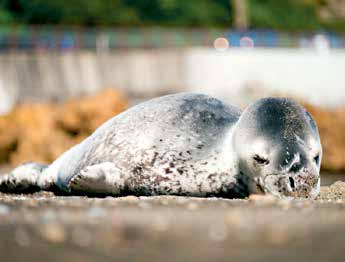Leopard seal spotted in Wellington
2 min read
Photo: Hamish McCormick, NIWA
A leopard seal washed up on Wellington’s waterfront last month captured the attention of dozens of people in the capital city’s Oriental Bay.
The police were called at 7.20am on Tuesday, 23 July and the Department of Conservation (DOC) was duly notified.
A ranger was appointed to guard the location—which had been cordoned off to avoid people from getting too close to the seal—to keep an eye on the seal and passers-by.
Leopard seals are primarily found in the Antarctic pack ice and are second only to killer whales in the list of Antarctica’s top predators
DOC issued a warning to the public asking them to stay at least 20 metres away from the seal and to not disturb the marine mammal by making loud noises or throwing things, to not feed the seals, keeping dogs and children away, and never attempt to touch a seal.
While they make look harmless, leopard seals are wild animals and will defend themselves if they feel threatened and can inflict serious injuries to dogs and people.
Leopard seals are primarily found in the Antarctic pack ice and are second only to killer whales in the list of Antarctica’s top predators. However, during autumn and winter, the animals occasionally visiting New Zealand.
This is not the first time though a leopard seal has been spotted in the country. For the past seven years, Owha, a female leopard seal, has been moving between Dunedin, the Bay of Plenty, Auckland, and Whangarei.
The seal prompted NIWA (The National Institute of Water and Atmospheric Research) cetacean biologist Dr Krista Hupman to find out if the mammals were truly vagrant visitors in New Zealand.
She set up leopardseals.org—a not-forprofit organisation—with fellow researcher Dr Ingrid Visser. Leopard seals are protected under the Marine Mammals Protection Act 1978 (MMPA).
DOC records all sightings and incident information in the National Marine Mammal Database. It is an offence under MMPA to disturb, harass, harm, injure or kill a seal and anyone charged can face a maximum penalty of two years’ imprisonment or a fine to a maximum of $250,000.
Sightings can be reported on 0800 DOC HOT or 0800 LEOPARD.



